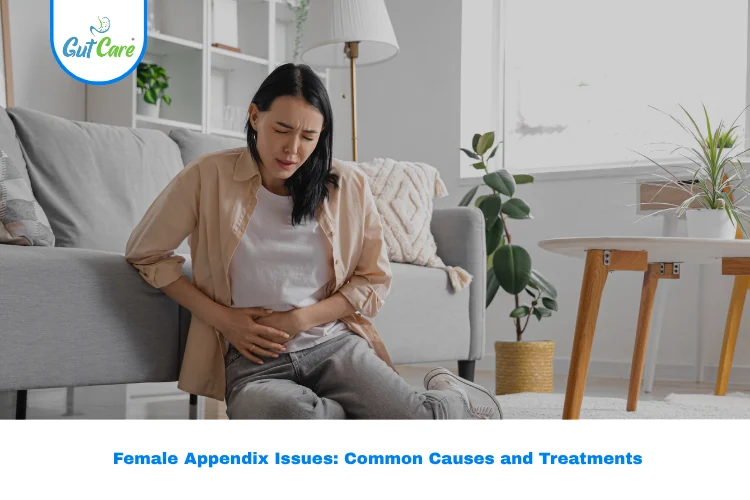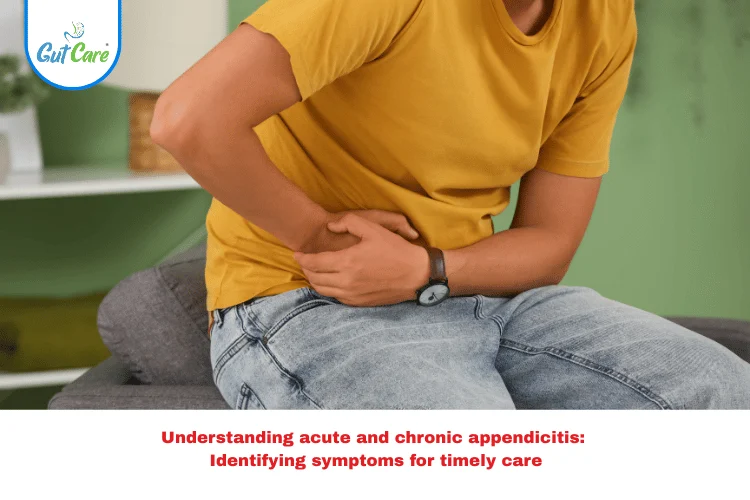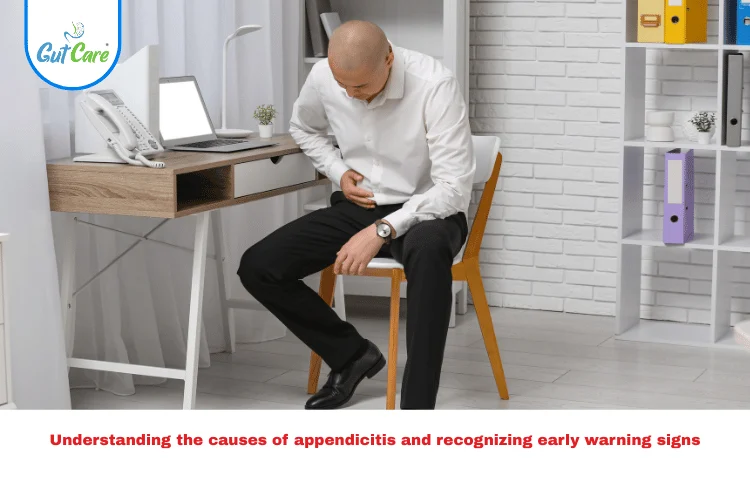The female appendix is a small, tube-like organ located in the lower right abdomen. While its exact function is still debated, problems such as appendicitis can lead to serious health risks if not treated in time. Women may face unique challenges in identifying appendix-related issues because the symptoms often overlap with gynecological conditions, such as ovarian cysts or pelvic infections. At Gutcare Clinics in Bangalore, under the expertise of Dr. Yuvrajsingh Gehlot, a leading colorectal surgeon, accurate diagnosis and effective treatment ensure women receive the right care without delays. Understanding the causes, symptoms, and treatments for female appendix problems is essential for timely intervention.
What Is the Female Appendix and Why Issues Occur
The appendix in women is located on the lower right abdomen, attached to the large intestine. Many wonder, what side is your appendix on female patients? The answer is the same as men: the right side.
Appendix problems typically occur when the opening of the appendix becomes blocked due to infection, stool, or swelling, leading to appendicitis.
Common Causes of Female Appendix Issues
- Blockage due to hardened stool or intestinal contents
- Infection in the digestive tract spreading to the appendix
- Swelling of lymphoid tissues after illness
- Rarely, tumors or growths obstructing the appendix
Signs and Symptoms of Female Appendix Problems
Recognizing the symptoms of appendicitis in female patients is sometimes tricky, as they may mimic menstrual cramps or ovarian conditions.
Early Signs
- Belly button pain female patients often report discomfort starting near the navel before shifting to the lower right abdomen.
- Nausea and vomiting
- Loss of appetite
Advanced Symptoms
- Sharp, persistent lower right abdomen pain
- Fever and chills
- Bloating and constipation or diarrhea
- Worsening pain during coughing, sneezing, or movement
Because the signs and symptoms overlap with gynecological issues, consulting a colorectal surgeon like Dr. Yuvrajsingh Gehlot is vital to avoid misdiagnosis.
How Appendix Issues Are Diagnosed in Women
Accurate diagnosis of appendix problems in women often requires:
- Physical Examination: Checking tenderness in the abdomen.
- Blood Tests: Looking for signs of infection.
- Ultrasound/CT Scan: To differentiate appendix issues from ovarian or uterine conditions.
This step is crucial since untreated appendicitis can lead to rupture, causing life-threatening infections.
Effective Treatments for Female Appendix Issues
When it comes to the management of appendix in women, treatment depends on the severity of symptoms and diagnosis results.
1. Medications
In very early cases, antibiotics may control infection and reduce swelling. However, this is only a temporary solution.
2. Appendectomy (Surgery)
The most effective treatment is surgical removal of the appendix.
- Laparoscopic Appendectomy: A minimally invasive procedure offering faster recovery and less pain.
- Open Surgery: Used in complicated cases such as ruptured appendix.
3. Post-Treatment Care
Patients receive dietary guidance, pain management, and follow-up care to avoid complications.
At Gutcare Clinics, Bangalore, advanced surgical techniques and compassionate care ensure women get safe and effective solutions tailored to their condition.
Why Timely Care Matters for Female Appendix Problems
Delaying treatment can lead to serious complications such as abscesses, peritonitis (infection in the abdominal cavity), or sepsis. Quick consultation with an expert ensures better outcomes, fewer complications, and faster recovery.
Prevention and Lifestyle Care
While you cannot always prevent appendix issues, maintaining digestive health reduces risks:
- Eat a fiber-rich diet to avoid blockages.
- Stay hydrated.
- Seek medical advice quickly when abdominal pain persists.
Conclusion
The female appendix may be a small organ, but its complications can become severe if ignored. Recognizing early symptoms of appendicitis in female patients, such as belly button pain shifting to the lower right abdomen, is crucial for timely diagnosis. At Gutcare Clinics, Bangalore, under the guidance of Dr. Yuvrajsingh Gehlot, patients receive accurate evaluation and effective treatment tailored to their needs. If you or someone you know is experiencing persistent abdominal pain, don’t delay early medical care is the key to safe recovery.
Frequently Asked Questions (FAQs)
1. What side is your appendix on female patients?
The appendix is located on the lower right abdomen, the same side for both men and women.
2. What are common symptoms of appendicitis in female patients?
The symptoms of appendicitis in female include belly button pain shifting to the lower right abdomen, nausea, loss of appetite, and fever.
3. Can belly button pain in female patients indicate appendix issues?
Yes, pain near the belly button that later shifts to the right side may be an early sign of appendicitis.
4. Why does the appendix happen in females?
Female appendix issues usually occur due to blockage, infection, or swelling, which triggers inflammation and pain.
5. Where can I find expert treatment for female appendix problems in Bangalore?
At Gutcare Clinics, Bangalore, Dr. Yuvrajsingh Gehlot, a skilled colorectal surgeon, provides accurate diagnosis and advanced treatment for appendix issues in women.




